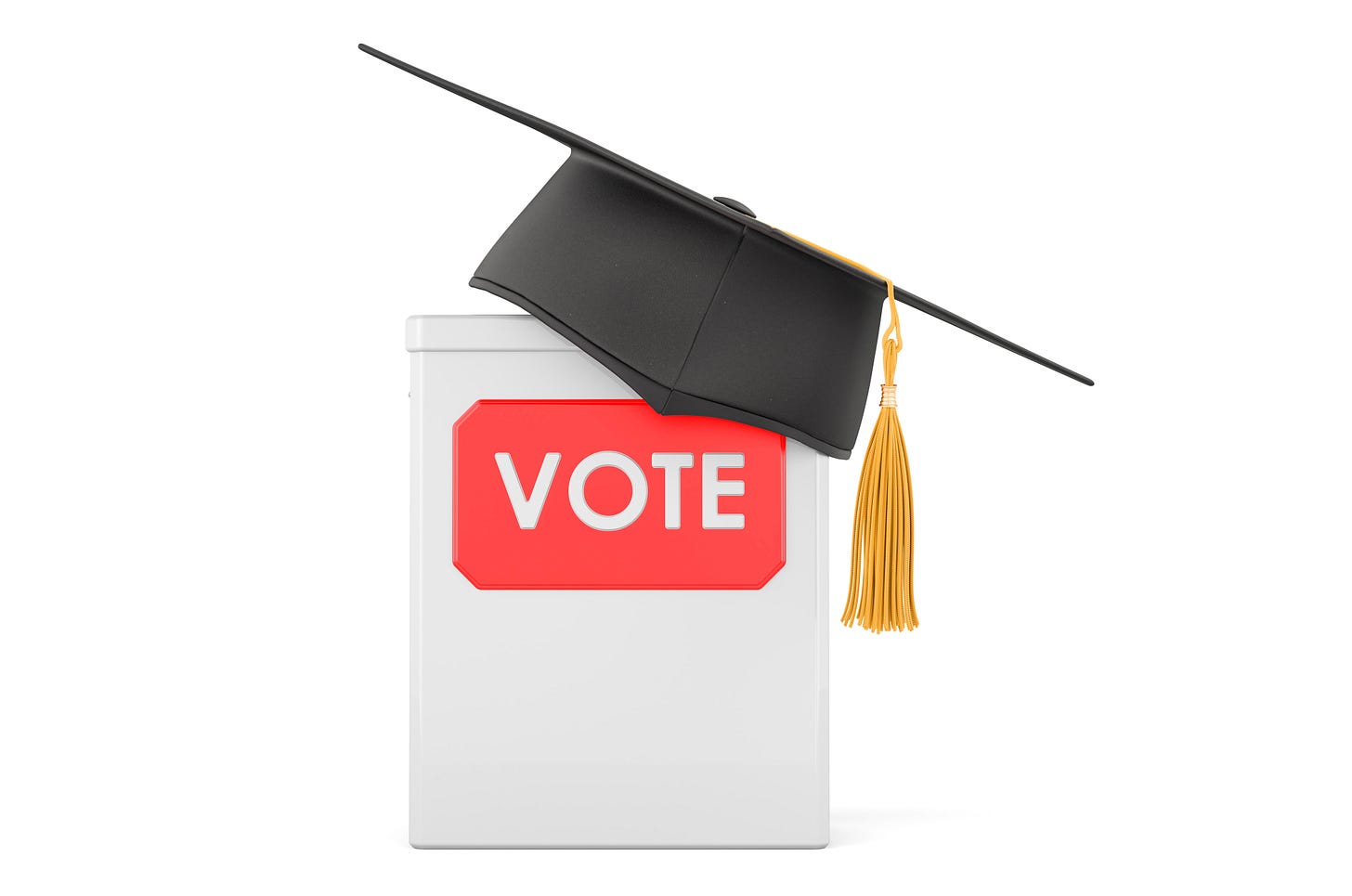The election, the elite, and the roots of our dysfunction
Highly educated Americans are arguing over abstractions, shaping the culture - and alienating non-graduates. Two major new books explain.
The closer we get to Election Day, the more helpful it is to step away from horse-race coverage and last-minute political gambits and ask: How did we get to this point?
The most compelling answer contains a deep irony. We live in an era in which the elite that wields the bulk of power in our society has become broader and more diverse than ever before. And yet, that elite has seldom been more unpopular.
“Elite” is obviously a contested term, but in this issue of Hypertext we feature two critically important new books that use it roughly in the same way, to describe the nearly two-fifths of Americans 25 and older who hold at least a bachelor’s degree. Along with that education, most of them have acquired an enormous economic advantage — and a distinctive worldview.
All of this means that the much-discussed “diploma divide” defining elections in the U.S. (and other wealthy democracies) runs far deeper than the polling place. David Hopkins and Niskanen Senior Fellow Matt Grossmann explain the stakes in their new book Polarized by Degrees:
Culturally progressive technocracy, the governance of society by socially liberal and well-educated experts, is winning a long-term battle, reshaping the governmental, business, and nonprofit sectors – but not without stimulating a major backlash that has redefined conservative politics.
With Harris and Trump at an apparent dead heat, pundits across the political spectrum are puzzling at why neither party seems capable of seizing the obviously available middle ground in American politics (see recent pieces by Yasha Mounk, David Brooks, and Liam Kerr — all citing the work of our friends Ruy Teixeira and Yuval Levin). Both parties certainly have room to moderate and, as we recently highlighted, to reassert themselves as vital organizations: A functioning, well-staffed, enduring party is the precondition for connecting with voters — and for desanctifying the commentariat “priesthoods” that, Brooks argues, now dominate the GOP and the Democrats.
But it may also be true that overcoming the educational break among Americans is harder than moderating, managing, and messaging. The diploma divide has become a gulf.
Meanwhile, a broader elite itself is awfully difficult to unify, particularly when its ranks are filled with people who make their living manipulating abstractions and who believe that words and symbols are the most vital political goods, as Musa al-Gharbi explains in a terrific new critique, We Have Never Been Woke.
These “symbolic capitalists” virtually all hold college degrees and as such have far better prospects than less educated Americans, al-Gharbi explains. They nonetheless will include many frustrated aspirants who cannot land the best jobs for which they are qualified. That frustration leads to a status competition among the elite’s relative winners and losers — a competition that takes the shape of claiming that one’s rivals are not living up to their professional obligation to advocate for the less fortunate. The irony, of course, is that the less fortunate generally could care less about these disputes — and more often than not, al-Gharbi notes, symbolic capitalists wage these fights while exploiting those people’s labor.
The “elite” in these stories is broad indeed, lumping adjunct professors who are barely scratching out a living with billionaires who are pouring money into political influence. Even Peter Turchin, the theorist of “elite overproduction” who predicted our age of instability, focuses his attention on people with a realistic shot at the highest positions of economic and political influence in society.
But Grossmann and Hopkins and al-Gharbi provide a compelling case for taking this wider angle. The resentments that billionaire political donors are able to exploit are not purely ginned up by a devious Republican Party. Nor is there a conspiracy of Ivy League intellectuals forcing “wokeness” down Americans’ throats.
Meanwhile, the differences between people who are highly educated and people who are not extend beyond cultural attitudes, into life expectancy, well-being, and critically, social status. Brink Lindsey provides a window into this deeper decline in social position in his essay, “The declining status and leverage of ordinary people.”
The upshot is that the transformations in our culture run deeper than politics — and so do our problems. As Lindsey has put it:
When people were telling pollsters that they no longer trusted government, what they had lost confidence in — what they were in the process of giving up on — were established institutions and governing elites. Rational-legal authority was gradually disintegrating, and people were reverting to charisma.
This collapse of legitimacy is the product of deep economic trends that have even deeper social ramifications, and with which we have not yet reckoned. Even if we avert the demagogue’s rule this time, our troubles will not be over until we do.
Read the excerpts and essays:
Grossmann and Hopkins: The rise of the caps and gowns
Grossmann and Hopkins: How conservatives lost the institutions
al-Gharbi: How elite competition turns into culture war
Lindsey: The declining leverage and status of ordinary people
Steven Teles: The other diploma divide
Geoff Kabaservice: Trump's triumph over the establishment
Please read, share widely, let us know what you think, and as always, pitch us a response essay if you are so moved.
David Dagan (@DavidDagan, @daviddagan.bsky.social) is Director of Editorial and Academic Affairs at the Niskanen Center.



